Over 30 neighbourhood committees in Brussels are denouncing the increasing feeling of insecurity and rising drug use in several neighbourhoods in an open letter, urging the Capital Region's Minister-President Rudi Vervoort and the mayors to take action.
Residents and traders from the districts of the North Station, Ribaucourt, Parvis de Saint-Gilles, Curegem, the Marolles and many other neighbourhoods in Schaerbeek, the City of Brussels, Molenbeek-Saint-Jean, Saint-Josse-ten-Noode, Saint-Gilles and Anderlecht are tired of the problems in their areas.
"The problems are spreading more and more and make the daily life of the residents difficult," wrote Eric Vandezande of the Yser-Sainctelette neighbourhood committee in an open letter to the authorities, which was then signed by more than 30 other neighbourhood committees and organisations.
"Our neighbourhoods are facing an increasing number of refugees [who are on the streets as the government's fails to provide them with the shelter they are legally entitled to], homeless people, beggars and people just roaming around. They hang around our streets and squares, in parks and metro and train stations," the letter reads. "Many have no papers, no or little connection to the area in which they are stranded and have nothing to lose. Since the Covid-19 period, the use and trafficking of crack has been added to this."
Quality of life 'profoundly' impacted
These factors result in an "enormous increase" in the feeling of insecurity in the neighbourhoods, said Vandezande. "There is increasing violence in public spaces: deaths in the metro, street fights where knives or other weapons are used, filthy streets and stations with drug waste, excrement, and more and more thefts."
The city's social urban fabric is in danger of falling apart, the committees said. "People no longer want to see their children grow up here and move away, elderly people no longer dare to walk the streets at night, parents do not want their young children to take the metro alone to school, sports squares and parks remain empty, and women and people of the LGBTQ+ community are insulted with sexist and derogatory statements."
"Many of us have personally experienced violence. The impact on our quality of life is profound," Vandezande said, stressing that urgent action is therefore needed. The neighbourhood organisations look to the mayors of the six municipalities involved, as well as to Minister-President Vervoort.
"We have a lot of questions and reservations about these situations. Other Belgian cities are not facing problems of the same magnitude," they said. "How is it that only Brussels has to deal with such a concentration of refugees, migrants, beggars and homeless people, to which the crack problem has recently grafted itself? How come the neighbourhoods in the canal zone have to cope with this concentration largely on their own?"
The committees questioned why there are not more police officers, city guards and neighbourhood workers on the streets, as well as counselling, medical assistance and housing. "Why is a structural, sustained comprehensive approach not being pursued, instead of fighting a few symptoms now and then, here and there?"
"We understand that there are all kinds of plans for the near or distant future, but we need the results now. It is not because this is a complex issue that nothing should be done or things should be postponed," he underlined.
Persistent problems needing permanent solutions
Vandezande underlined that residents expect more from the government: "We feel like the law of the jungle prevails on the streets in our neighbourhoods. But our problems are not new, they persist and get worse by the day."
"We need permanent solutions. As soon as possible. To prevent new incidents and to be able to continue our daily lives here in a normal way," he added. "The inhabitants of your municipalities, of your region, feel unheard, misunderstood, neglected and like second-class citizens. We urge you to assume your responsibilities. Now! Together. For your citizens."
The day after the letter was published, Vervoort's cabinet on Wednesday announced that he is inviting a delegation of citizens and associations (such as committees from the Ribaucourt and Yser areas) to a meeting next Friday "to take stock of the situation."

Police at Brussels-Midi railway station. Credit: Belga/Thierry Roge
The aim of the meeting is not only to listen to the residents' concerns but also to find solutions. Vervoort's invitation has raised some eyebrows as many have criticised his perceived absence from the debate surrounding the safety around the Brussels-Midi station, which suffers from similar problems described in the letter.
While the problems at Midi have been worsening for a while, it was only when the CEO of the SCNB railway company Sophie Dutordoir denounced the insecurity in the station (also in an open letter) that the federal authorities started to get involved.
Now, Prime Minister Alexander De Croo has taken the lead on the situation and convened a meeting with the Ministries for Home Affairs, Asylum and Migration and Mobility, the Brussels Regional authorities, the local authorities for Anderlecht and Saint-Gilles and railway company SNCB.
Vervoort welcomed the initiative, saying that the problem "transcends Brussels," and the authorities "have long since been unable to handle it alone."


